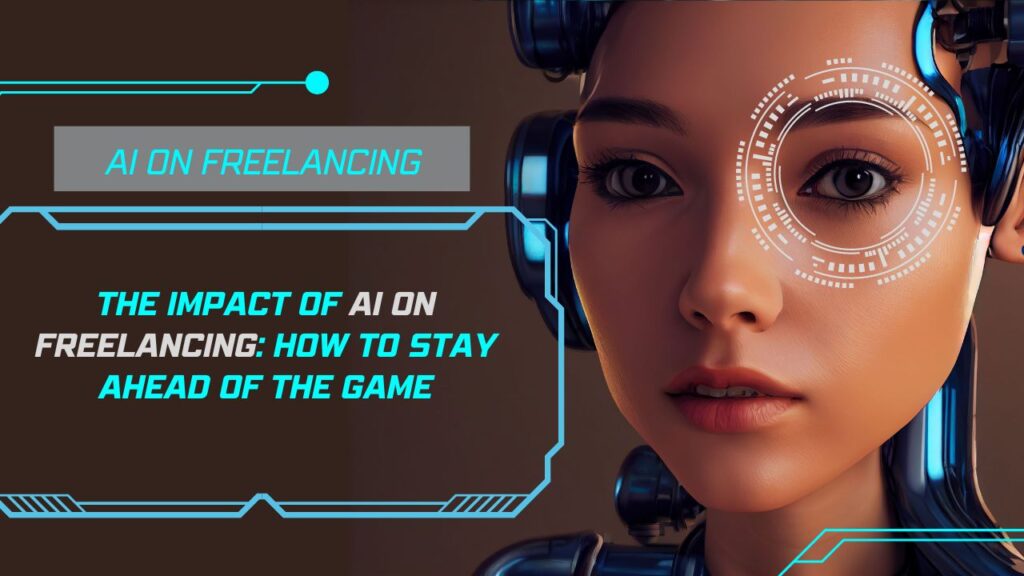I. Introduction
Artificial intelligence (AI) is becoming increasingly prevalent in the modern job market, and the freelance industry is no exception. With the rapid advances in AI technology, the way we work is changing, and freelancers need to be able to adapt to these changes to stay competitive.

This article will explore the impact of AI on the freelance industry and provide strategies for freelancers to stay ahead of the game in an AI-driven job market.
II. The Current State of AI and Freelancing
AI is being used in freelancing in a variety of ways, including:
- AI-powered chatbots that can provide customer service and support to clients.
- AI algorithms that can match freelancers with job opportunities based on their skills and experience.
- AI tools that can automate repetitive tasks and workflows, such as data entry or content creation.
- AI-powered platforms that can analyse data and provide insights for businesses.
- AI-assisted creativity in the design of digital content, both written and visual
While there are many advantages to using AI in freelancing, there are also some potential drawbacks. For example, some freelancers may need help to compete with AI-powered tools and platforms that can perform tasks more efficiently than humans. Additionally, some clients prefer to work with AI tools because they can save time and money.
III. How AI is Changing the Freelance Job Market
AI is having a significant impact on the demand for different types of freelance work. For example, some jobs that require more repetitive or administrative tasks, such as data entry or content creation, may be more vulnerable to automation. On the other hand, jobs that require more complex problem-solving skills or creative expertise, such as graphic design or copywriting, may be less likely to be replaced by AI.
As AI becomes more prevalent in the freelance industry, freelancers must adapt their skills and expertise to stay competitive. This may involve developing new skills related to AI technology, such as data analysis or programming, or focusing on less likely automated areas.
IV. How to Stay Ahead of the Game in the Age of AI
To stay competitive in an AI-driven job market, freelancers must develop strategies for leveraging AI tools. Some tips for staying ahead of the game include:
- Investing in AI training and education to develop new skills and expertise.
- Focusing on areas that are less likely to be automated, such as creative or problem-solving tasks.
- Emphasizing the value that human freelancers can provide, such as personalization and creativity
- Leveraging AI-powered tools and platforms to enhance their work and deliver more excellent value to clients
V. The Future of AI and Freelancing
The future of AI and freelancing will likely involve further developments in AI technology and its integration into the freelance industry. As AI becomes more prevalent, the job market will continue to evolve, and freelancers must adapt and innovate to stay competitive.
However, the future of AI and freelancing is not all doom and gloom. AI technology can offer many benefits to freelancers, including increased efficiency, better data analysis, and more personalized client experiences. By embracing AI and using it to their advantage, freelancers can stay ahead of the game and thrive in an ever-changing job market.
VI. The Importance of Training for Freelancers in the Time of AI
A. Benefits of training for Freelancers in the time of AI
- Enhance skills and stay competitive: With the rapid development of AI, freelancers need to upskill to remain relevant and competitive in the market continuously.
- Expand job opportunities: Learning AI-related skills can help freelancers explore new jobs in emerging fields such as machine learning, natural language processing, and computer vision.
- Improve productivity: AI tools and techniques can automate repetitive tasks, thus allowing freelancers to focus on high-value work and increase productivity.
- Build trust with clients: Clients are more likely to hire freelancers who possess AI-related skills and can demonstrate how they can add value to their business.
B. Training areas for Freelancers in the time of AI
- Machine learning: Machine learning is an essential skill for freelancers interested in data science, predictive modelling, and other related fields. Freelancers can take online courses or enrol in boot camps to learn machine learning concepts and techniques.
- Natural language processing: As more businesses adopt chatbots and virtual assistants, freelancers with expertise in natural language processing can find lucrative opportunities. Online courses and tutorials can help freelancers learn the basics of natural language processing and develop text classification, sentiment analysis, and language translation skills.
- Computer vision: Freelancers can take courses to learn about image processing, object recognition, and computer vision, which can be applied in various industries, including e-commerce, healthcare, and automotive.
C. Best practices for Freelancers to thrive in the time of AI.
- Keep up with the latest trends: Freelancers should stay informed about AI trends and techniques, including attending conferences, workshops, and webinars.
- Build a strong portfolio: Freelancers should develop a portfolio that showcases their AI-related skills, including relevant projects and case studies.
- Collaborate with other freelancers: Collaborating with other freelancers can help you learn new skills and stay up-to-date with the latest trends. It can also lead to potential project opportunities.
Focus on high-value work: Freelancers should focus on work that requires human skills and judgment and cannot be easily automated by AI. This will ensure that they continue to provide value to their clients even as AI becomes more prevalent in the industry.
Conclusion
The rise of AI is transforming the freelance industry, and freelancers need to adapt by continuously upskilling in areas such as machine learning, natural language processing, and computer vision. By doing so, they can stay competitive, expand their job opportunities, and increase their productivity. Freelancers should also focus on high-value work, build a strong portfolio, and collaborate with other freelancers to thrive in AI.
References:
Here are six references for further reading on the importance of training for freelancers in the time of AI:
- “Artificial Intelligence and the Future of Freelance Work.” Harvard Business Review, 2 Jan. 2020, hbr.org/2020/01/artificial-intelligence-and-the-future-of-freelance-work.
- “How Freelancers Can Stay Relevant in the Age of AI.” Forbes, 23 July 2020, forbes.com/sites/ashleystahl/2020/07/23/how-freelancers-can-stay-relevant-in-the-age-of-ai.
- “AI and the Future of Freelancing: How Artificial Intelligence is Changing the Freelance Landscape.” Upwork, 20 Nov. 2019, upwork.com/resources/ai-and-the-future-of-freelancing.
- “The Rise of AI and What it Means for Freelancers.” Freelancer, 5 Aug. 2020, freelancer.com/community/articles/the-rise-of-ai-and-what-it-means-for-freelancers.
- “Preparing for the Future of Work with AI and Freelancing.” IBM, 29 Oct. 2020, ibm.com/blogs/watson-talent/preparing-for-the-future-of-work-with-ai-and-freelancing.
- “AI and Freelancing: What You Need to Know.” Hubstaff Blog, 17 Sept. 2020, blog.hubstaff.com/ai-and-freelancing.

Related Contents
- Freelance Writing Opportunities
- Jasper.ai for Non-Native English Speakers: How to Improve Your Writing Skills with AI
- Become a Freelance Writer
- Finding Freelance Writing Jobs
- Freelance Editing
- Freelance Proofreading
- Web Content Writing
- Jasper AI Helps Freelance Copywriters Produce Quality Content Quickly
- Make AI Content Writing Work for You With Jasper.AI
- Content Ranking Guide- Using Surfer SEO’s and Jasper AI’s Artificial Intelligence
- AI Guest Posting Guide To Using Surfer SEO’s and Jasper AI’s Artificial Intelligence To Increase Your Income
- 15 Freelance Income Opportunities from Ai Content Writing for Our Generation
- College Students Freelancing 101 Guide To Starting Writing With AI
- How to Write a Winning Business Proposal as a Freelancer
- How to Get Into Video Editing- Tips for Beginners
- What Is Freelance Digital Marketing
- What Are Some Good Freelance Writing Jobs for Students?
- What are the Benefits of Using ChatGPT















